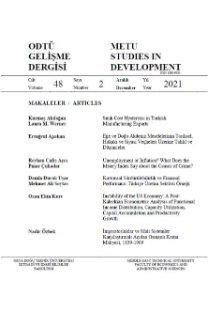Türkiye’de iktisadî artık
İktisadî artık, bir ülkede bir zaman diliminde üretilen hâsıladan, bunu üretmek için gerekli hâsıla miktarı çıkarıldıktan sonra arta kalan hâsıla payıdır. İktisadî artık toplumun lüks tüketimde veya üretim kapasitesini artırmak için yatırımda kullanabileceği veya çeşitli şekillerde israf edebileceği hâsıla payıdır. Bu çalışmanın amacı kavramın tarihçesini özetledikten sonra Baran ve Sweezy'nin 1966 yılında yayımlanan Tekelci Sermaye kitabında tanımladığı iktisadî artık kavramına dayanarak Türkiye için iktisadî artığı hesaplamak ve elde edilen artığın kullanılma biçimini ortaya koymaktır. İktisadî artığın büyüklüğünün ve kullanılma biçiminin gelişmekte olan ülkelerin büyüme ve kalkınma çabaları açısından önemine dikkat çekmek amaçlanmaktadır.
The economic surplus in Turkey
The economic surplus is the remaining part of a national product after deducting the part that is used up in its production. It is that part of national product that is available for superfluous consumption, capacity expanding investment or various forms of waste. The history of the concept is briefly summarized and a estimation of the economic surplus in Turkey and its utilization is presented, based on the definition given in Baran’s and Sweezy’s 1966 Monopoly Capital. The significance of the size and utilization of the surplus for economic growth and development is reiterated
___
- BARAN, P. A. (1957), The Political Economy of Growth, Monthly Review Press, New York.
- BARAN, P. A. ve SWEEZY, P. M. (1966), Monopoly Capital, Monthly Review Press, New York.
- BARCLAY, J. W. ve STENGEL, M. (1975), “Surplus and Surplus Value”, Review of Radical Political Economics, 7 (4), 48-64.
- DANIELSON, A. (1990), “The Concept of Surplus and the Underdeveloped Countries: Critique and Suggestions”, Review of Radical Political Economics, 22 (2-3), 214-230.
- DAVIS, J. (1992), “The Monopoly Capital Approach to the Concept of Economic Surplus”, içinde J.
- Davis (der.), The Economic Surplus in Advanced Economies, Edward Elgar Publishing Limited, İngiltere, 1-16.
- GAREGNANI, P. (1988), “Surplus approach to value and distribution”, içinde J. Eatwell, M. Milgate and P. Newman (der.), The Palgrave: A Dictionary of Economics, 4. cilt, Macmillan, Londra, 560-573.
- HUNT, E.K. (2016), İktisadi Düşünce Tarihi (Çev. Vedat Ulvi Aslan), Phoenix, Ankara.
- KALECKI, M. (1954), Theory of Economic Dynamics, George Allen and Unwin, New York.
- KEYNES, J. M. (1973). The General Theory of Employment Interest and Money, Macmillan, İngiltere.
- LIPPIT, V. D. (1985), “The Concept of the Surplus in Economic Development”, Review of Radical Political Economics, 17 (1-2), 1-19.
- MARX, K. (2010), Kapital (Cilt I) (Çev. Mehmet Selik ve Nail Satlıgan), Yordam Kitap, İstanbul.
- MARX, K. (2015), Kapital (Cilt III) (Çev. Mehmet Selik ve Erkin Özalp), Yordam Kitap, İstanbul.
- MOTT, T. (1992), “In What Sense Does Monopoly Capital Require Monopoly? An Essay on the Contribution Kalecki and Steindl”, içinde J. Davis (der.), The Economic Surplus in Advanced Economies, Edward Elgar Publishing Limited, İngiltere, 114-129.
- ÖZEL, H. (2001), “İktisadi Analiz Tarihine Nasıl Yaklaşmak Gerekir?”, Hacettepe Üniversitesi İktisadi ve İdari Bilimler Fakültesi Dergisi, 19 (2), 19-38.
- PHILLIPS, J. D. (1992), “Estimating the Economic Surplus”, içinde J. Davis (der.), The Economic Surplus in Advanced Economies, Edward Elgar Publishing Limited, İngiltere, 21-41.
- RICARDO, D. [1969 (1817)], The Principles of Political Economy and Taxation, Everyman’s Library, Londra.
- SELİK, M. (2015), İktisadi Doktrinler Tarihi, Efil Yayınevi, Ankara.
- SMITH, A. [1999 (1776)], The Wealth of Nations. Books IV-V, Penguin Books, Londra.
- STANFIELD, R. (1973), The Economic Surplus and Neo-Marxism, Lexington Books, Londra.
- STANFIELD, J. R. (1974), “A Revision of the Economic Surplus Concept”, Review of Radical Political Economics, 6 (69), 69-74.
- STANFIELD, J. R. (1992), “The Fund for Social Change”, içinde J. Davis (der.), The Economic Surplus in Advanced Economies, Edward Elgar Publishing Limited, İngiltere, 130-148.
- ISSN: 1010-9935
- Yayın Aralığı: Yılda 3 Sayı
- Başlangıç: 2018
- Yayıncı: ODTÜ İİBF
Sayıdaki Diğer Makaleler
MÜRÜVVET İLKNUR BÜYÜKBOYACI HANAY, SERKAN KÜÇÜKŞENEL
Measurement of NAIRU: What is new and what is next for the Turkish economy?
Cihan Tuğal, The Fall of the Turkish Model: How the Arab Uprisings Brought Down Islamic Liberalism
Klasik üretim fonksiyonu bağlamında RTS ve EOS ilişkisi: Saf teorik bir analiz
Economic growth and technological progress in Turkey: An analysis of Schumpeterian mechanisms
